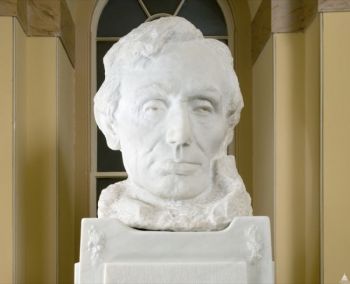The Gift of South Dakota
Subscriptions to South Dakota Magazine make great gifts!
Subscribe today — 1 year (6 issues) is just $29!
Lincoln Lives
Dec 3, 2012
Some years ago on my blog I enthusiastically praised the televised reenactments of the Lincoln-Douglas debates produced by C-Span. I believe all the debates were filmed at the locations in Illinois where the two candidates for Senate faced off against one another in 1858. I was particularly fond of the performance of Michael Krebs. He wore no beard — an historically accurate detail, as the famous whiskers came much later. Instead of the ponderous, tragic figure that most would-be Lincolns offer us, this guy was bright-eyed and cheeky. His manner was much closer to the spirit of Lincoln as it flows from the pages of the debates as well as Lincoln’s other writing and speeches. This performance helped me understand how this young lawyer went so quickly from nowhere to the Presidency. Shortly after my post I received a nice note from Mr. Krebs himself, for which I was very grateful. It’s not every day that one gets an email from Abraham Lincoln.
Much as I still admire that performance, I can no longer say that it was the best Lincoln I have seen on film. Daniel Day-Lewis is one of the best actors working today. His portrayal of our 16th President in Steven Spielberg’s Lincoln is simply brilliant.
Lincoln was our greatest president because he served during the nation’s greatest peril and proved equal to the task. Without the slavery crisis and secession, Lincoln’s genius would likely have gone unrecognized. One can only shudder to think of how the crisis might have been resolved without him.
Lincoln combined all the political virtues. He understood that the soul of the nation is expressed in the Declaration of Independence. In the film, Lincoln remarks on his early reading of the ancient Greek geometer, Euclid. “When any two things are both equal to a third,” he says with his charming smile, “they are equal to one another.” That is a strictly logical expression of the phrase “all men are created equal.” He hated slavery both because of the monstrous evil of the thing itself and because it was, in the most profound sense, anti-American.
If Lincoln was a master of political logic, he was also a master of men. The film shows us how his powerful rhetoric burned itself into the minds of foot soldiers in that terrible war. It also shows how Lincoln played small ball politics, shrewdly and relentlessly, to bring the 13th Amendment through the House of Representatives and end slavery forever.
I was pleased to see the local theater filled nearly to capacity when I sat down to watch Lincoln. A small army of excellent actors (including Sally Field as Mary Todd Lincoln), exquisite dialogue, along with very fine storytelling and directing, make this one of the great pieces of historical film making. It is also a testament to the enduring influence of Abraham Lincoln’s character in our national consciousness. If you want to know what the United States is all about, spend a couple of hours with Lincoln.
Editor's Note: Ken Blanchard is our political columnist from the right. For a left-wing perspective on politics, please look for columns by Cory Heidelberger every other Wednesday on this site.
Dr. Ken Blanchard is a professor of Political Science at Northern State University and writes for the Aberdeen American News and the blog South Dakota Politics.





Comments